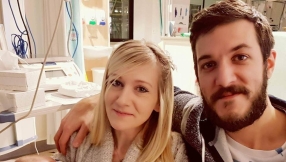Filipino Christians testify mistreatment of brothers, sons and husbands
The pastor was taken at gunpoint and dragged into a van. His hands were hogtied. A plastic bag pulled over his head nearly suffocated Guerrero and made him pass out twice, so the abductors beat him to wake him up. Guerrero was abducted and tortured to force him to admit membership in the clandestine Communist Party of the Philippines.
"They [the abductors] even told my husband that they would rape me and my daughter in front of him if he would not name leaders of supposedly underground organisations," recalls Guerrero's wife Mylene.
Guerrero's abduction took place on 27 May 2006. Luckily, his life was spared, unlike the lives of more than 800 activists, church workers and journalists who died in extrajudicial killings since 2001.
But Guerrero has since been jailed over what his wife says are trumped up charges of murder, which he supposedly committed 17 years ago. With the support of church and human rights groups, the family is still fighting for the resolution of the case.
The Guerreros' ordeal was one of the testimonies heard by a World Council of Churches (WCC) delegation on the very first day of a 18-21 November visit to this insular south-east Asian country.
Headed by WCC general secretary Rev Dr Samuel Kobia, the delegation included Sophia Adinyira, a justice of the Supreme Court of Ghana and a member of the (Anglican) Church of the Province of West Africa; Rev Dr Sandy Yule, the national secretary for Christian Unity of the Uniting Church in Australia; and WCC programme executive for Asia Dr Mathews George Chunakara.
The ecumenical delegation also heard the continuing plea of former journalist-educator Editha Borguz for the military to bring back her son Jonas, an advocate for farmers' rights who was abducted by armed men on 28 April 2007.
Borguz recalled how she went to all the government agencies - from the military and the police to the Commission on Human Rights to President Gloria Macapagal-Arroyo - to no avail. "It has been 206 days since my son disappeared and I'm still hoping that he is alive because we don't have yet evidence of his death", she said.
There was also the story of Jonathan Sta. Rosa, whose brother Isaias, a pastor of the United Methodist Church, was forcibly taken from their house on 3 August 2006 and later summarily executed. Jonathan himself was tortured. Both brothers were suspected of being members of the New People's Army (NPA), the armed wing of the clandestine Communist Party of the Philippines (Maoist), which has been waging a guerrilla warfare for over 38 years.
Four other survivors and victims of human rights violations also told their stories during the encounter organised by the National Council of Churches of the Philippines. They gave human faces to the statistics and reports of state violence and abuses.
With 85% of its about 83-million population belonging to several Christian confessions, the Philippines is the only predominantly Christian country in Asia.
The majority Roman Catholic Church was established under the 16th to 19th century Spanish colonial rule, while Protestant missions arrived during the early 20th century. The National Council of Churches (NCCP) was founded in 1963, following a number of predecessors, the earliest of which dates back to 1900.
An ecumenical grouping of the "mainline" Protestant churches, the NCCP consistently opposed the martial law imposed by Ferdinand Marcos in 1971. They played an important role in raising people awareness about issues of militarisation, corruption, violation of human rights and the exploitation of people. During the four days of the historic February 1985 pacific uprising - known as the "people power revolution" - that put an end to Marcos' dictatorship, Catholic priests and nuns and Protestant pastors and church workers were seen rallying together.
Recently, the NCCP has been at the forefront of the human rights advocacy. Last March, its report "Let the stones cry out" brought to the attention of the United Nations Human Rights Council and other instances of the international community the "collective cry for justice of thousands of Filipinos [...] who have suffered the brunt of violations of human rights under the Philippine government's counter-insurgency and counter-terrorism strategies".
At that time, the number of victims of extra-judicial executions counted since 2001 was over 800. It is near 900 now, although according to Marie Hilao-Enriquez of the human rights watchdog Karapatan their frequency has decreased. But "forced disappearances have, however, increased", she adds.
"We want to reassure you about our continuing accompaniment in your journey towards peace and justice", Kobia said after listening to the stories of human rights victims and survivors.
Recalling the WCC's long-standing commitment in support of the Filipino people, he affirmed the Council would continue pressuring the Philippine Government to ratify the International Convention for the Protection of All Persons from Enforced Disappearance, as well as to fulfil its obligations under international human rights law.
Amidst the stories of pain, suffering and the seeming helplessness of the human rights victims and survivors, who have little chance for immediate justice, the WCC delegation comforted and encouraged them not to lose hope.
Earlier on the same day, the delegation attended a memorial service for Bishop Alberto Ramento. A leader of the Iglesia Filipina Independiente (Philippine Independent Church), Ramento's killing in October 2006 was due to his staunch human rights advocacy, according to fellow church workers.
"As we learn not to fear," Kobia said in his homily before Ramento's relatives and members of the homegrown church, "we embrace hope and vision of another Philippines."
Maurice Malanes is a freelance journalist from the Philippines. Currently a correspondent for Ecumenical News International (ENI), he also writes for the Manila-based Philippine Daily Inquirer, and the Bangkok-based Union of Catholic Asian News (UCAN).













